 Drug lord’s ego leads to capture, but bigger issues remain. 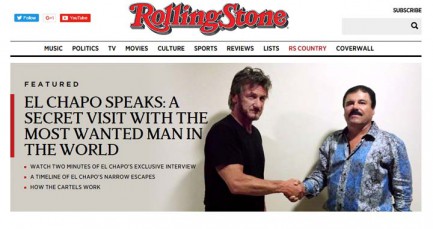
Last night Rolling Stone, one of the U.S.’s top investigative magazines, published a pulp-worthy article on its website about Mexican drug lord Joaquín Guzmán Loera, aka El Chapo. The magazine sent actor Sean Penn to the jungles of Mexico to interview Guzmán, a meeting that came about at the drug kingpin’s behest because he was interested in making a movie about his life. Long story short—Guzmán ended up being captured Friday in Sinaloa, Mexico after a gun battle with police, and his ongoing contact with Hollywood figures was the primary factor that led authorities to him. Guzmán has been imprisoned before, so nothing new there. He escaped both times. He may well escape again. His most recent breakout is detailed in the Rolling Stone article—he disappeared through a hole in his shower (see below), dropped into a mile-long tunnel, and rode away on a specially designed motorcycle on rails that had been modified to run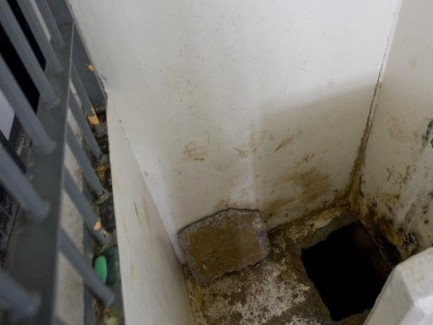 in a low-oxygen environment. All this took at least $1 million to achieve. According to Penn and Rolling Stone, Mexican engineers were flown to Germany for specialized training in tunnel building. in a low-oxygen environment. All this took at least $1 million to achieve. According to Penn and Rolling Stone, Mexican engineers were flown to Germany for specialized training in tunnel building. The article is worth a read. Penn describes being waved through police checkpoints to Guzmán’s jungle lair, and when that fact is measured against his capture, it suggests a factionalized Mexican state, with the president and certain other top authorities conducting an anti-drug crusade even as military figures, federal officers, and local cops often work for the drug lords. But Mexico is not uniquely corrupt, and that is something that must be emphasized. The wealthy north is also in the drug trade. Consider—the British bank HSBC knowingly laundered hundreds of millions of dollars of Guzmán’s drug profits. Yes, they knew about it. The bank was caught, and its heads talked about a “failure of standards,” but all the bankers skated from justice for this terrible crime thanks to their connections in the political world. Is this any different from Joaquín Guzmán motorcycling to freedom through a tunnel? We don’t think so. This is something that global authorities desperately want to keep the general public from understanding—the drug trade is an integral part of capitalism, not some dark subset of it. Not convinced? The U.S. bank Wachovia laundered drug cartel money and deliberately failed to apply anti-laundering measures to 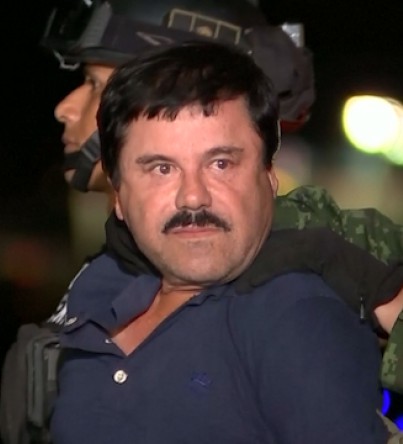 $378.4 billion that passed through the institution. That amount of money is equal to one-third of Mexico's gross national product. The result? Fines of about $160 million—less than 2% of the yearly profits—and no jail for anyone in the executive suite. The list goes on. Liberty Reserve, Bank of America, Western Union, and J.P. Morgan all have drug ties. There are doubtless more we don't yet know about. $378.4 billion that passed through the institution. That amount of money is equal to one-third of Mexico's gross national product. The result? Fines of about $160 million—less than 2% of the yearly profits—and no jail for anyone in the executive suite. The list goes on. Liberty Reserve, Bank of America, Western Union, and J.P. Morgan all have drug ties. There are doubtless more we don't yet know about. Articles in The Wall Street Journal and other establishment papers try to paint the banks as victims. Yet in the end, there are always executives who know exactly what’s happening—just like the cops that waved Sean Penn through those Mexican checkpoints. Besides, since when do victims get to charge millions in fees for their crimes? In the same way U.S. slavery was enabled by banks in New York City and Boston, which even accepted slaves as collateral, the southern drug trade cannot exist without the money laundering operations of the northern banks. And the amounts of money involved don’t just influence markets—it shapes them. Roberto Saviano, possibly the world’s foremost expert on the global drug trade, and author of the blockbuster exposé Zero Zero Zero, says, “It’s not the world of cocaine that must orbit around the markets, but the markets that must rotate around cocaine.”
 Everything being said by people who hate Bank of America was proved true by our recent experience. 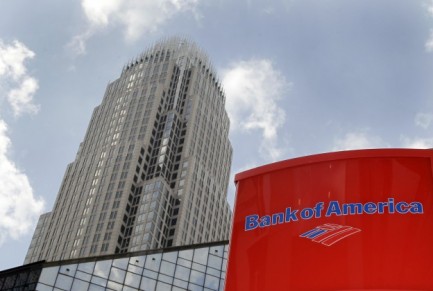
At Pulp Intl. we have an entire category labeled “swindles and scams,” and we think this qualifies. It all started when a cash card we rely upon stopped working a few days before Christmas. Terrible timing, of course. Gifts to buy, revelry to enjoy. But the screen of the cash machine read in glowing green letters: Transaction not possible. An immediate call to Bank of America revealed that they had cancelled the card. Why? Because a new one had been sent. But that made no sense—nothing had arrived in the mail. We asked, baffled, “So you cancelled the card without permission, even though it hasn’t expired and a new one hasn’t been activated?” The associate, who called himself Elton, said, “The old card is expired.”
“No, it’s cancelled. You cancelled it. But it isn’t expired. It was supposed to run until December 31.”
“No, the card is only active until December 2013. That means it can be cancelled anytime during the month.”
“I have the card right here. It says it’s active until the last day of December.”
“No, it doesn’t say that.”
“Yes, it does.”
“It does not.” (See below)
Now, we had to wonder, do they not know what their own cards say? But of course they know. It’s just that Elton’s default move when told the bank had made a mistake was to lie, just like his superiors lie to investors, and the top executives lie to the entire world. When in doubt, just lie. But to make matters worse, he crossed the line from merely lying to blaming the customer. That’s the strategy they tried with the mortgage crisis, so perhaps it’s in the corporate bylaws somewhere. Maybe BofA should simply change its call center greeting to, “Thank you for calling Bank of America. We can’t help you, and it’s your fault.” During the nine calls made to Bank of America, we were told variously that the social security number we gave them was not on file thus we had no account there; a new cash card had been sent; a new cash card had not been sent; and that two cash cards were already open on the account. In a truly bizarre turn, during one encounter we answered the three security questions we’d selected for account verification, but Elton (again) decided that, though we had fulfilled our security requirements, that wasn’t enough and he asked us a fourth question we got wrong. He demanded to know at which branch we’d opened the account, which was something we couldn’t remember after having lived in three countries and five cities since then. So then what was the point of the pre-selected security questions? Apparently nothing—the bank can simply quiz callers until they get something wrong. Their ace-in-the-hole is probably to ask the airspeed velocity of an unladen swallow. But maybe Bank of America is simply too busy to actually help customers. After all, in 2013 alone it lost a $2.43 billion lawsuit for hiding income, a $39 million gender bias lawsuit, had to pay a $404 million settlement related to mortgage fraud, a $165 million settlement over defrauding unions, and that isn’t even a full list. Based on available evidence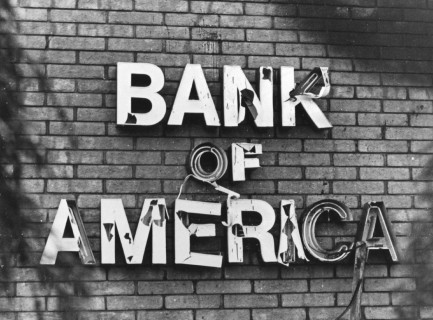 Bank of America is an extraordinarily corrupt institution that absolutely sucks all the way down to the little slot in its cash machines. The eventual resolution of our particular fiasco was this: a new card arrived after two weeks (no faster unless we wanted to pay out of pocket for express mail). Now that it’s here, we’re going to empty the account and Bank of America will be out of our lives forever. Bank of America is an extraordinarily corrupt institution that absolutely sucks all the way down to the little slot in its cash machines. The eventual resolution of our particular fiasco was this: a new card arrived after two weeks (no faster unless we wanted to pay out of pocket for express mail). Now that it’s here, we’re going to empty the account and Bank of America will be out of our lives forever.
There is one positive to all this: having been treated as if we don’t exist by the bank, we at least have the option of telling tens of thousands of Pulp Intl. visitors what happened. Does it matter in the end? Doubtful. Does the bank care? Certainly not. But at least we can add another anecdote to the growing tome of horror stories about Bank of America. And sharing our story here feels better than merely passing bad word of mouth to a few buddies at the bar. So thanks for listening. Now we can get back to your regularly scheduled pulp with all that off our minds.
|
 |

The headlines that mattered yesteryear.
2003—Hope Dies
Film legend Bob Hope dies of pneumonia two months after celebrating his 100th birthday. 1945—Churchill Given the Sack
In spite of admiring Winston Churchill as a great wartime leader, Britons elect
Clement Attlee the nation's new prime minister in a sweeping victory for the Labour Party over the Conservatives. 1952—Evita Peron Dies
Eva Duarte de Peron, aka Evita, wife of the president of the Argentine Republic, dies from cancer at age 33. Evita had brought the working classes into a position of political power never witnessed before, but was hated by the nation's powerful military class. She is lain to rest in Milan, Italy in a secret grave under a nun's name, but is eventually returned to Argentina for reburial beside her husband in 1974. 1943—Mussolini Calls It Quits
Italian dictator Benito Mussolini steps down as head of the armed forces and the government. It soon becomes clear that Il Duce did not relinquish power voluntarily, but was forced to resign after former Fascist colleagues turned against him. He is later installed by Germany as leader of the Italian Social Republic in the north of the country, but is killed by partisans in 1945.
|

|
|

It's easy. We have an uploader that makes it a snap. Use it to submit your art, text, header, and subhead. Your post can be funny, serious, or anything in between, as long as it's vintage pulp. You'll get a byline and experience the fleeting pride of free authorship. We'll edit your post for typos, but the rest is up to you. Click here to give us your best shot.

|
|


 in a low-oxygen environment. All this took at least $1 million to achieve. According to Penn and Rolling Stone, Mexican engineers were flown to Germany for specialized training in tunnel building.
in a low-oxygen environment. All this took at least $1 million to achieve. According to Penn and Rolling Stone, Mexican engineers were flown to Germany for specialized training in tunnel building. $378.4 billion that passed through the institution. That amount of money is equal to one-third of Mexico's gross national product. The result? Fines of about $160 million—less than 2% of the yearly profits—and no jail for anyone in the executive suite. The list goes on. Liberty Reserve, Bank of America, Western Union, and J.P. Morgan all have drug ties. There are doubtless more we don't yet know about.
$378.4 billion that passed through the institution. That amount of money is equal to one-third of Mexico's gross national product. The result? Fines of about $160 million—less than 2% of the yearly profits—and no jail for anyone in the executive suite. The list goes on. Liberty Reserve, Bank of America, Western Union, and J.P. Morgan all have drug ties. There are doubtless more we don't yet know about.

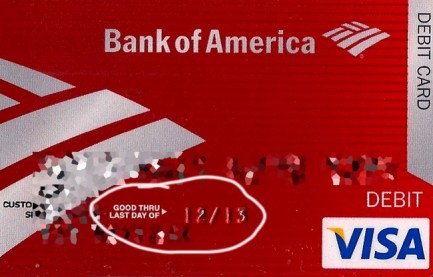
 Bank of America is an extraordinarily corrupt institution that absolutely sucks all the way down to the little slot in its cash machines. The eventual resolution of our particular fiasco was this: a new card arrived after two weeks (no faster unless we wanted to pay out of pocket for express mail). Now that it’s here, we’re going to empty the account and Bank of America will be out of our lives forever.
Bank of America is an extraordinarily corrupt institution that absolutely sucks all the way down to the little slot in its cash machines. The eventual resolution of our particular fiasco was this: a new card arrived after two weeks (no faster unless we wanted to pay out of pocket for express mail). Now that it’s here, we’re going to empty the account and Bank of America will be out of our lives forever.



































































